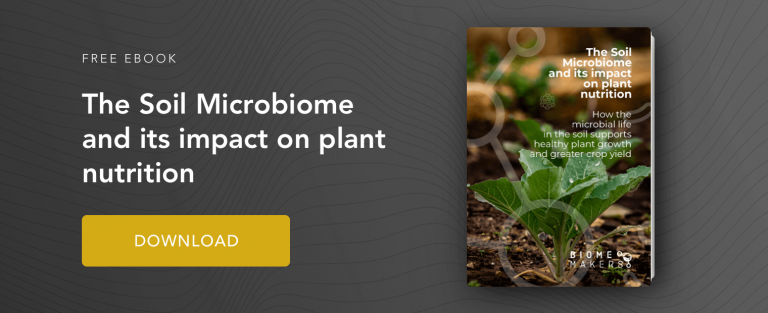Share this
The Soil Microbiome and its Impact on Plant Nutrition
by Juan Vicente Beneitez Lajas on 31/Aug/22

The soil microbiome has a significant impact on plant nutrition. Plants are part of a rich ecosystem that comprises numerous and diverse microorganisms that live in the soil. It’s long been known that some of these microbes, like certain types of fungi or nitrogen-fixing symbiotic bacteria, play an important role in crop health and yield by improving mineral nutrition. However, it’s only been recent that researchers have begun to uncover the full extent of these organisms’ impact and the role they could play in replacing synthetic agricultural inputs.
Considering the challenges that the global agricultural ecosystem faces, soil microbiome research and the impact on plant nutrition is of vital importance. As we progress further into the 21st century, it’s crucial that we find solutions to produce nutritious food for a growing world population. The global population is increasing at a rate of 1.14% per year and is set to reach 9.5 billion by 2050. Equally, the climate crisis is spurring demand for biofuels, which need to be cultivated in sufficient quantities without impacting food production.
However, arable soils have been degraded through erosion and exhaustive cultivation for decades. Moreover, substantial amounts of fertilizer nutrients are not taken up by crops, casting doubt over their agricultural and financial worth. Therefore, a central challenge in agriculture is to better understand how soil’s resident microbial communities can deliver nutrients to crops more efficiently with minimal losses to the environment and, indeed, a farm’s bottom line.

We seek to lay out a foundation of how the soil microbiome affects plant nutrient uptake. We’ll introduce some of the key functions of the different types of soil compounds and how they affect plant nutrition or ‘nutrition pathways’ and also briefly explain how microbes can impact these functions. Finally, we outline Biome Maker’s innovative soil analysis technique and explain how it’s useful for monitoring soil nutrient levels.
Share this
- March 2026 (1)
- June 2025 (2)
- September 2024 (1)
- August 2024 (1)
- July 2024 (1)
- June 2024 (2)
- May 2024 (2)
- April 2024 (2)
- March 2024 (1)
- February 2024 (1)
- January 2024 (1)
- November 2023 (1)
- October 2023 (1)
- September 2023 (1)
- August 2023 (2)
- July 2023 (2)
- May 2023 (2)
- April 2023 (3)
- March 2023 (3)
- February 2023 (2)
- January 2023 (1)
- November 2022 (1)
- October 2022 (2)
- September 2022 (1)
- August 2022 (3)
- July 2022 (3)
- June 2022 (1)
- May 2022 (5)
- April 2022 (7)
- August 2021 (1)
- July 2021 (1)
- May 2021 (1)
- April 2021 (4)
- November 2020 (3)
- October 2020 (4)
- September 2020 (1)
- August 2020 (3)
- July 2020 (1)
- June 2020 (1)
- May 2020 (2)
